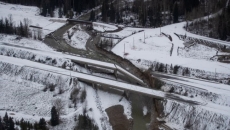Experts say Canada needs to develop a robust system to detect COVID-19 activity in the absence of wide-scale PCR testing.
Since the onset of the Omicron variant, provinces and territories have scaled back access to gold-standard PCR testing, citing the lack of capacity to keep up with demand and the need to free up health-care resources.
Many people have since relied on results from rapid antigen tests, but they aren't as reliable at detecting the Omicron variant or reported and tracked the way PCR tests are. Experts say there needs to be a better way of informing people about COVID-19 activity in their communities.
Dr. Caroline Colijn, a mathematician and epidemiologist at Simon Fraser University, said there are currently "too many infections" in Canada to expand access to PCR tests to everyone to find out the true number of infections.
She said more robust programs could also be used to pick up other kinds of respiratory infections.
"And I suspect those are under development, but until they're developed, deployed, and results are publicly available, people will have trouble finding out what their risks are in their social group, in their community and in their workplace," she said.
"So then they'll have trouble having the information needed to inform their own choices, their own workplace or community policies."
Colijn said wastewater data is a really important source of information that can be publicly shared without compromising anyone's private medical data and can help communities understand the prevalence of COVID-19. But like PCR and rapid tests, she said it has its limitations.
She noted there are numerous factors that could change wastewater signals, such as rainfall, temperature and different variants leaving different amounts of sequencing in the water, resulting in less accurate COVID-19 case estimates.
Colijn said she anticipates an integrated system that would incorporate wastewater data, along with PCR and rapid test results, in a way that's designed to paint a more accurate picture of how much COVID-19 is in a population and inform people about the risk of contracting the virus.
"So we do need to think about how to get representative samples, and how to understand how many infections are out there," she said.
Dr. Dan Gregson, an infectious disease physician and medical microbiologist at the University of Calgary, said it would be reasonable to expand PCR testing access to certain settings like schools and long-term care homes in the event of an outbreak so they can make a decision on whether to close those institutions to prevent further transmission.
However, he said the average person can rely on wastewater data to assess the risk of contracting COVID-19 in their community since it's "much more cost-effective" and "tells us similar information" to PCR testing.
Dr. Peter Juni, scientific director of the Ontario COVID-19 Science Advisory Table, said it's "likely not sustainable" to expand access to PCR testing to all symptomatic individuals again because of the high cost of the tests.
Juni noted that when PCR testing was available to all residents in Ontario, only somewhere between 30 and 45 per cent of infections were being detected because not everyone with the virus was getting tested. Some may have been asymptomatic, while others may not have had time to get tested., and still others may not have been getting tested early enough.
As for rapid antigen tests available in Canada, he said they have shown "lower test performance" when it comes to detecting the Omicron variant.
What's needed is a COVID-19 detection system that can use a random sample in a population "to try to understand what's actually happening and which can be ramped up if needed," Juni said.
"If we see in wastewater, for instance, that infections start to increase, (then) we actually can really activate the system or extend it a bit, but it will be just a surveillance system that gives us enough situational awareness."






